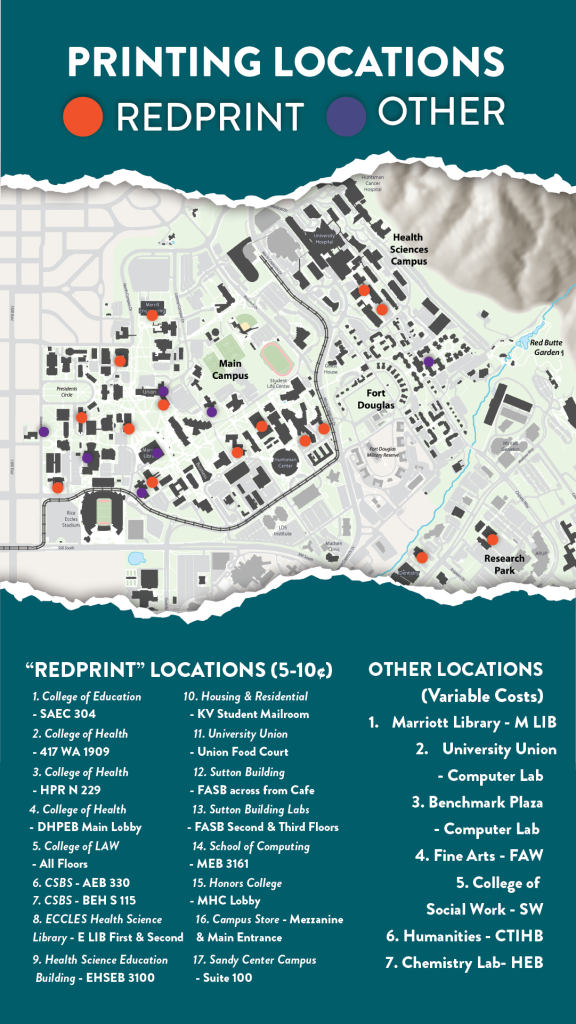 Moving forward, the $2 printing credit will be applied at the beginning of the fall semester and remain available until the end of the spring.
Moving forward, the $2 printing credit will be applied at the beginning of the fall semester and remain available until the end of the spring.
In 2020, first year students, Muskan Walia and CJ Reid experienced a common challenge among students: printing lengthy documents for their classes. The expenses quickly added up and required Walia and Reid to add funds to their UCard accounts multiple times throughout the year.
So, they jumped into action by becoming members of the First-Year Council, a group of first-year representatives within the Associated Students of the University of Utah (ASUU).
There, they found a platform to address their concern and enlisted the help of other passionate students. Together they embarked on a mission to research printing services on campus, gather insights from other universities, and devise a plan to provide students with free printing.
“I remember struggling during my freshman year, trying to print those lengthy exams and feeling like there had to be a better way,” said Walia. That experience fueled my determination to make printing accessible and affordable for all students. It’s incredibly gratifying to see our efforts culminate in this initiative that will benefit thousands of students at the University of Utah.”
Implementation of the program was not without significant challenges. Concerns from student government legislators, compounded with infrastructural challenges, leaving Walia and Reid’s goals out-of-reach for their first year. However, they wasted no time over the summer break drafting new legislation and working alongside partners in the UCard Services office. Partners Bryon Buchmiller, director, and Ron Wells, senior systems administrator, evaluated a possible restructure of the UCard system on the backend to accomplish their goals.
During the first two years of the pilot program, 2021-23, the new initiative was supported using ASUU funding, which was always intended to be a temporary solution. The credit was applied to the accounts of all fee-paying students including undergraduates and graduates. During this time, Walia, Reid, and their team collected data on printing usage and student needs. They continued to meet with the UCard Services office to analyze the printing data and fine-tune the program based on real-world results.

Click to enlarge
The data showed that printing costs on campus were not as exorbitant as some had thought. In the pre-pandemic years, campus-wide printing costs started out at roughly $101,000 in 2018 and $92,000 in 2019. And costs plummeted to $55,000 in 2020 as the pandemic impacted normal campus operations.
As campus returned to “normal operations” in the 2021-22 academic year, they gathered fresh data that indicated only 23% of students spent more than $5 on printing during the spring semester. The program had cost only $3,800 that semester, substantially less than they had expected.
Walia, Reid and their team had amassed a compelling dataset that showcased the need for the university to fully fund the $2.00 of free printing for every student. The culmination of their efforts arrived this academic year when the program officially transitioned from a student initiative to a University funded program.
Walia and Reid found an additional partner in Jenn Reed, associate vice president for Auxiliary Services, alongside Buchmiller and Wells from the UCard office.
In March 2023, the students presented the data, making a persuasive case for the university to cover the costs of free printing. After thorough review and consultation with her team, Reed agreed to include this initiative in her budget proposal, which was subsequently approved.
“Looking for ways to increase student resources is crucial for a more equitable and accessible campus. This program is a meaningful step towards that goal and it’s incredibly exciting that the University is providing this resource for students. This 4-year initiative absolutely wasn’t easy, but it was possible because Ron, Bryon, and Jenn were not only supportive, but empowering and collaborative—something for which we cannot thank them enough,” said Reid.
Together, they delved into the technological aspects, ensuring the seamless implementation of the program. Reed also ensured that the relevant departments were informed of the university’s commitment to providing this essential service.
“This initiative not only eases the financial burden on students but also exemplifies the power of student-led change and the university’s commitment to enhancing the student experience,” said Reed.
Today, the U is now better equipped than ever to support the academic success of its diverse student body, ensuring that printing materials no longer stand in the way of their learning journeys.
To read Walia and Reid’s legislation that was approve by their peers, click here.
